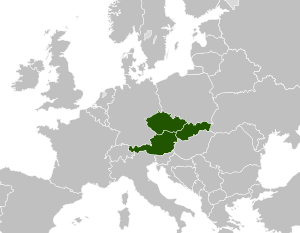The Slavkov Declaration
The "Austerlitz format" or "North-Trilateral"[1] or "Slavkov trilateral"[2] is a loose cooperation between the Central European States Czech Republic, Slovakia and Austria.

Name
The name derives from the South Moravian city Austerlitz. It is known for the Battle of Austerlitz of 1805, which is also called the "Battle of the Three Emperors".
Background
In the form of the Visegrád Group an agreement had already existed since 15 February 1991 on cooperation between the Central European countries Poland, Czech Republic, Slovakia and Hungary. In particular, it was a concern to expand this group to include Slovenia and Austria. On 3 April 2014, the Czech President Miloš Zeman announced at a press conference in Ljubljana, Slovenia, that Slovenia and Austria will also participate in the meetings of an enlarged Visegrád group in the future.[3] However, the Hungarian Ministry of Foreign Affairs by his spokesman, Gábor Kaleta, circulated on 4 April 2014 To understand that an expansion of the Visegrád Group is not planned and thus rejected Zeman's offer to Slovenia and Austria.[4]
Apart from Hungary's reluctance to include Slovenia and Austria in the Visegrád Group, the different points of view regarding the Russian sanctions in the wake of the Ukraine conflict on the one hand and the three states of the Czech Republic, Slovakia and Austria on the other proved to be an obstacle on the way To an expansion of the Visegrád group.[1]
It was therefore necessary to find a different framework for enhanced cooperation. On January 29, 2015, the Prime Minister of Czech Republic Bohuslav Sobotka and Slovakia Robert Fico and the Austrian Chancellor Werner Faymann came together in Slavkov u Brna, Austerlitz near Brno. The 'Austerlitz Declaration' was signed and the Austerlitz format was launched.[5]
Petr Drulák, the deputy minister of the Czech Republic, emphasized, however, that the Austerlitz format was not a competition, but an addition to the Visegrád group.[6]
References
- Oeschger, Roman (11 February 2015). "Kooperation zwischen Österreich, Tschechien und der Slowakei: Konkurrenz zur Visegrád-Gruppe?" (in German).
- Nič, Milan; Dostál, Vít (2015-02-11). "Slavkov trilateral: No challenge to V4". GLOBSEC Policy Institute. Archived from the original on 2015-05-18.
- Martin, Lothar (2014-04-03). "Slowenien und Österreich werden an Sitzungen der Visegrad-Staaten teilnehmen - Radio Prag". radio.cz (in German).
- https://web.archive.org/web/20140408214154/http://www.kormany.hu/en/ministry-of-foreign-affairs/news/expanding-visegrad-group-not-on-the-agenda. Archived from the original on 2014-04-08. Missing or empty
|title=(help) - "Austerlitz Declaration" (PDF). www.vlada.cz.
- Schubert, Gerald (2015-04-11). "Österreich, Tschechien, Slowakei: Gemeinsame Politik im Austerlitz-Format" (in German). Der Standard.